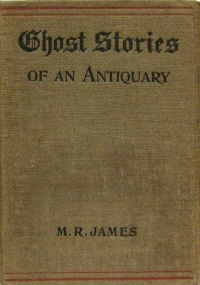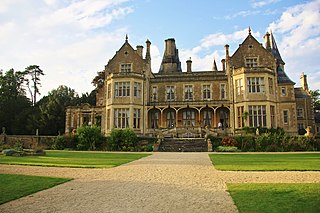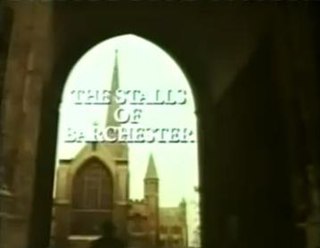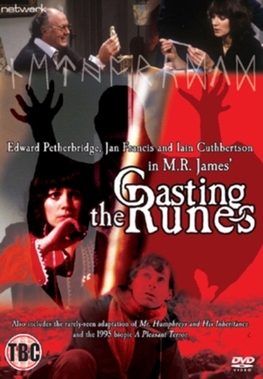
Montague Rhodes James was an English medievalist scholar and author who served as provost of King's College, Cambridge (1905–1918), and of Eton College (1918–1936) as well as Vice-Chancellor of the University of Cambridge (1913–1915). James's scholarly work is still highly regarded, but he is best remembered for his ghost stories, which are considered by many critics and authors as the finest in the English language and widely influential on modern horror.

Michael Dennis Bryant was a British stage and television actor.

Ghost Stories of an Antiquary is a collection of ghost stories by British writer M. R. James, published in 1904. Some later editions under this title contain both the original collection and its successor, More Ghost Stories (1911), combined in one volume.
Lawrence Gordon Clark is an English television director and producer, screenwriter, and author, best known for creating the supernatural anthology series A Ghost Story for Christmas, which originally aired on BBC One from 1971–1978, with Clark directing all but the final instalment as well as writing and producing the first two, The Stalls of Barchester (1971) and A Warning to the Curious (1972). The first five of these were based on the ghost stories of M. R. James, as was Casting the Runes (1979) which he directed for the ITV drama anthology series Playhouse.

Orchardleigh is a country estate in Somerset, approximately two miles north of Frome, and on the southern edge of the village of Lullington. The privately-owned estate comprises a Victorian country house, Orchardleigh Lake with its island church, and an 18-hole golf course. It operates as a wedding and events venue.

"Whistle and I'll Come to You" is a supernatural short television film which aired as an episode of the British documentary series Omnibus. Written and directed by Jonathan Miller, it is based on the ghost story "'Oh, Whistle, and I'll Come to You, My Lad'" by M. R. James, first published in the collection Ghost Stories of an Antiquary (1904), and first aired on BBC1 on 7 May 1968.

A Ghost Story for Christmas is a strand of annual British short television films originally broadcast on BBC One between 1971 and 1978, and revived sporadically by the BBC since 2005. With one exception, the original instalments were directed by Lawrence Gordon Clark and the films were all shot on 16 mm colour film. The remit behind the series was to provide a television adaptation of a classic ghost story, in line with the oral tradition of telling supernatural tales at Christmas.

The Church of St Mary is a 13th-century church in the grounds of the Orchardleigh Estate in Somerset, England.

"A Warning to the Curious" is a ghost story by British writer M. R. James, included in his book A Warning to the Curious and Other Ghost Stories first published in 1925. The tale tells the story of Paxton, an antiquarian and archaeologist who holidays in "Seaburgh" and inadvertently stumbles across one of the three lost crowns of East Anglia, which legendarily protect the country from invasion. Upon digging up the crown, Paxton is stalked by its supernatural guardian. Written a few years after the end of the First World War, "A Warning to the Curious" ranks as one of M. R. James's bleakest stories.

The Stalls of Barchester is a short film which serves as the first of the British supernatural anthology series A Ghost Story for Christmas. Written, produced, and directed by the series' creator Lawrence Gordon Clark, it is based on the ghost story "The Stalls of Barchester Cathedral" by M. R. James, first published in the collection More Ghost Stories (1911). It stars Robert Hardy as Archdeacon Haynes of the fictional Barchester Cathedral, whose mysterious death is investigated 50 years later by the scholar Dr. Black, and first aired on BBC1 on 24 December 1971.

"The Treasure of Abbot Thomas" is a ghost story by British writer M. R. James. It was published in his book Ghost Stories of an Antiquary (1904).

"The Ash-tree" is a ghost story by British writer M.R. James, included in his 1904 collection Ghost Stories of an Antiquary.

Stigma is an episode of the BBC's A Ghost Story for Christmas series, made in 1977. It was the first of only two stories set in the actual year of its making, and the last which mainstay Lawrence Gordon Clark would direct. It was first shown on BBC One on 29 December 1977, and was repeated on 29 May 1978. Scripted by Clive Exton, the thirty-minute piece stars Kate Binchy, Peter Bowles and Maxine Gordon.
The Ice House is the last of the eight short films originally broadcast as part of the BBC's A Ghost Story for Christmas series of the 1970s, the first not directed by Lawrence Gordon Clark; Clark had become a freelance director and was working for ITV. The film was instead directed by Derek Lister.

Paul Lavers is a British film, television and stage actor. He has been a presenter for Anglia Television and for several shopping channels.

Count Magnus is a short film which is part of the British supernatural anthology series A Ghost Story for Christmas. Produced by Isibeal Ballance and written and directed by Mark Gatiss, it is based on the ghost story of the same name by M. R. James, first published in the collection Ghost Stories of an Antiquary (1904), and first aired on BBC Two on 23 December 2022.

Lost Hearts is a short film, the third of the British supernatural anthology series A Ghost Story for Christmas. Written by Robin Chapman, produced by Rosemary Hill, and directed by the series' creator, Lawrence Gordon Clark, it is based on the 1895 ghost story of the same name by M. R. James and first aired on BBC1 on 25 December 1973. It is the first instalment to have been broadcast on Christmas Day itself, and one of only three in the series' history.

A Warning to the Curious is a short film, the second of the British supernatural anthology series A Ghost Story for Christmas. Written, produced, and directed by the series' creator, Lawrence Gordon Clark, it is based on the ghost story of the same name by M. R. James, first published in the collection A Warning to the Curious and Other Ghost Stories (1925) and first aired on BBC1 on 24 December 1972. At 50 minutes it is the longest instalment in the series' original run.

The Ash Tree is a 1975 supernatural fiction short film produced by the BBC. Running at 32 minutes, it was based on the short story "The Ash-tree" by British writer M. R. James which was included in his 1904 collection Ghost Stories of an Antiquary. The story was adapted by David Rudkin as "The Ash Tree", and was part of the BBC's A Ghost Story for Christmas strand. It was first broadcast on 23 December 1975 at 11.35pm. The adaptation stars Edward Petherbridge in the dual role of Sir Richard and Sir Matthew and Barbara Ewing as the witch, Anne Mothersole. It was directed by Lawrence Gordon Clark.

Casting the Runes is a supernatural television drama produced by ITV in 1979. Running at 50 minutes, it was based on the ghost story Casting the Runes by British writer and academic M. R. James, first published in 1911 as the fourth story in More Ghost Stories, which was James' second collection of ghost stories. Directed by Lawrence Gordon Clark for the series Playhouse, produced by Yorkshire Television, it was first broadcast on ITV on 24 April 1979. Adapted by Clive Exton, it reimagined the events of James's story taking place in a contemporary television studio.




















